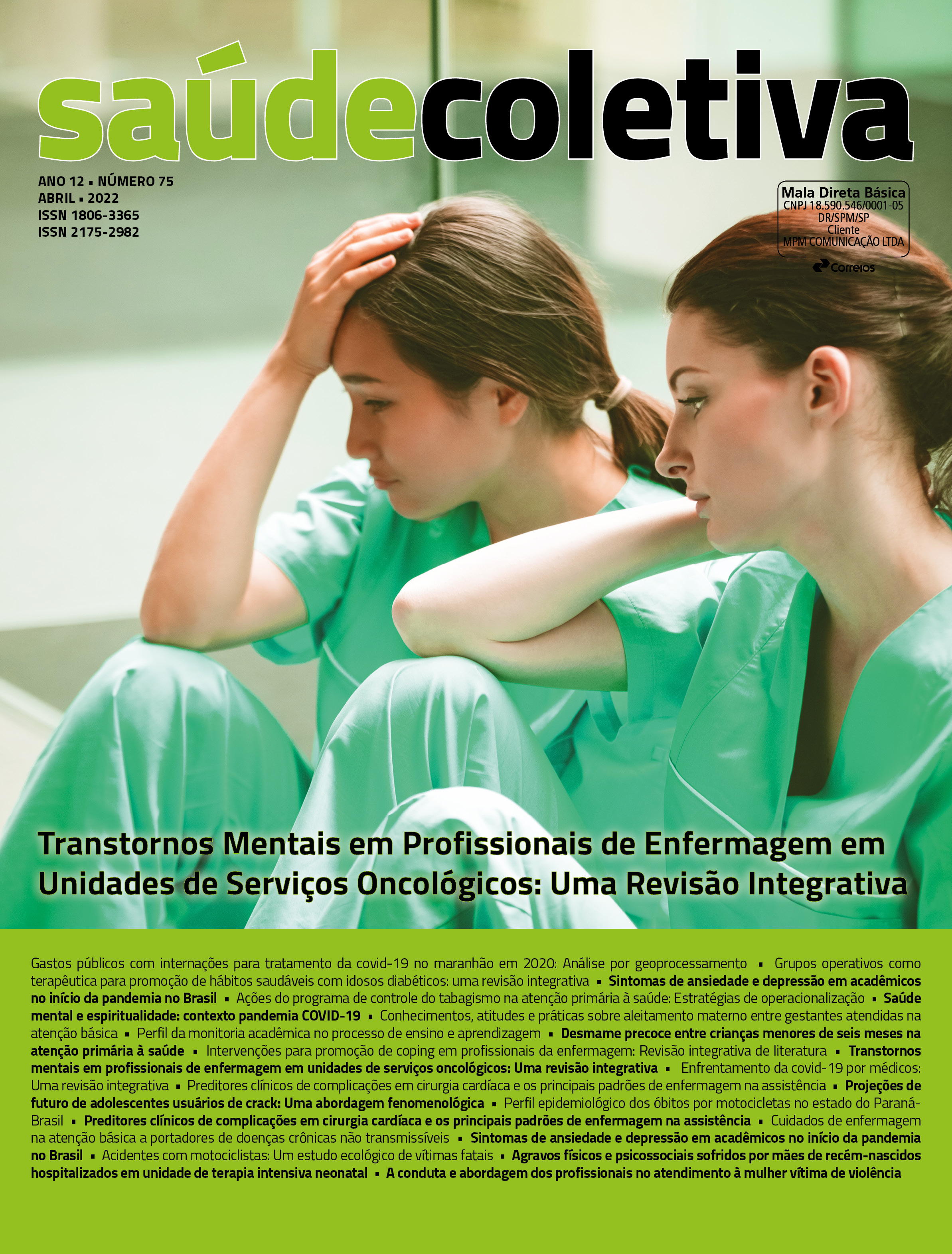Interventions to promote coping in nursing professionals: Integrative literature review
DOI:
https://doi.org/10.36489/saudecoletiva.2022v12i75p10166-10175Keywords:
Adaptation psychological, Emotional adjustment, Burnout professional, Stress psychological, Nursing teamAbstract
Objective: to identify and map, in the scientific literature, interventions to promote coping and overcome occupational stressors in nursing professionals. Method: integrative literature review, via the CAPES Journal Portal, in the Pubmed, CINAHL, Scopus and WoS databases, in February 2021. Experimental studies published between January 2011 and January 2021 were included. Results: of the 4662 publications retrieved, three (03) articles were included in the review. These tested different coping mechanisms, namely: auriculotherapy, progressive muscle relaxation with music therapy and a stress management program. In the three studies, the interventions were considered statistically and significantly efficient to improve coping and as a tool for managing occupational stress when compared to the control group. Conclusion: when training nursing professionals in problem-solving coping skills, they tend to implement and improve such mechanisms for their own benefit and those around them.
References
Fernandes MA, Sousa DC, Lima TR, De Olveira ALCB, Ribeiro HKP. Nursing professionals’ perception of psychosocial factors and work with substance-dependent patients. Rev Bras Med do Trab. 2018;16(3):297–304.
Campos Oliveira J, Pedreira Rodrigues J, Nunes Goncalves Fonseca K, Oliveira da Silva Lima R, Carvalho Souza T, Cabral de Carvalho R. Adoecimento e saúde mental diante do cenário de pandemia covid-19, vivenciando pelos profissionais de enfermagem. Saúde Coletiva (Barueri). 2022;12(2), 9571–9584. Available from: https://doi.org/10.36489/saudecoletiva.2022v12i2p9571-9584
Hasan AA, Tumah H. The correlation between occupational stress, coping strategies, and the levels of psychological distress among nurses working in mental health hospital in Jordan. Perspect Psychiatr Care. 2019;55(2):153–60.
Antoniazzi AS, Dell’Aglio DD, Bandeira DR. O conceito de coping: uma revisão teórica. Estud Psicol [Internet]. 1998 [cited 2020 Aug 20];3(2):273–94. Available from: http://www.scielo.br/pdf/epsic/v3n2/a06v03n2
Ravalier JM, Wegrzynek P, Lawton S. Systematic review: Complementary therapies and employee well-being. Occup Med (Chic Ill). 2016;66(6):428–36.
Awa WL, Plaumann M, Walter U. Burnout prevention: A review of intervention programs. Patient Educ Couns. 2010;78(2):184–90.
Mendes KDS, Silveira RC de CP, Galvão CM. Revisão integrativa: método de pesquisa para a incorporação de evidências na saúde e na enfermagem. Texto Context Enferm. 2008;17(4):758–64.
Brasil. Lei número 9.610, de 19 de fevereiro de 1998. Altera, atualiza e consolida a legislação sobre direitos autorais e dá outras providências. Diário Of da União [Internet]. 1998;1–21. Available from: https://www.planalto.gov.br/ccivil_03/leis/l9610.htm
Kurebayashi LFS, Gnatta JR, Borges TP, Silva MJP da. Applicability of auriculotherapy in reducing stress and as a coping strategy in nursing professionals. Rev Lat Am Enfermagem [Internet]. 2012 Oct;20(5):980–7. Available from: https://www.scielo.br/pdf/rlae/v20n5/pt_21.pdf
Ozgundondu B, Gok Metin Z. Effects of progressive muscle relaxation combined with music on stress, fatigue, and coping styles among intensive care nurses. Intensive Crit Care Nurs [Internet]. 2019 Oct;54:54–63. Available from: https://doi.org/10.1016/j.iccn.2019.07.007
Alkhawaldeh JM, Soh KL, Mukhtar F, Peng OC, Alkhawaldeh HM, Al‐Amer R, et al. Stress management training program for stress reduction and coping improvement in public health nurses: A randomized controlled trial. J Adv Nurs [Internet]. 2020 Nov 28;76(11):3123–35. Available from: https://onlinelibrary.wiley.com/doi/10.1111/jan.14506







